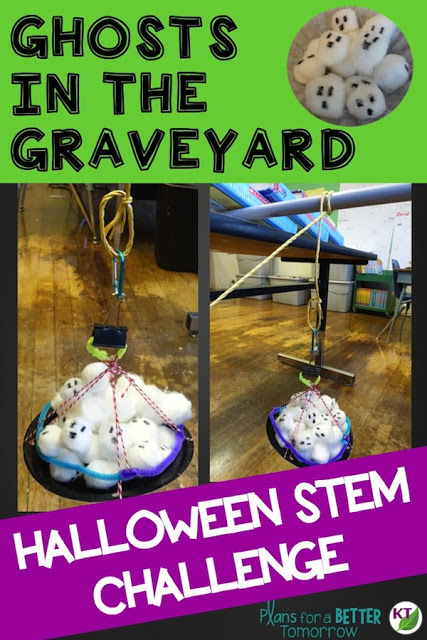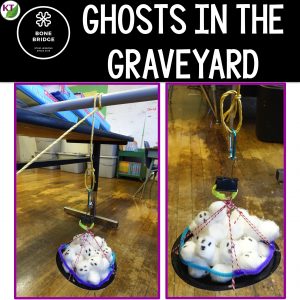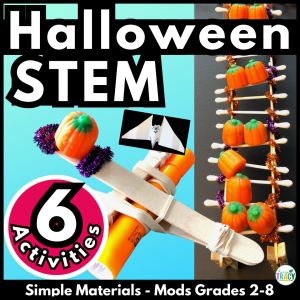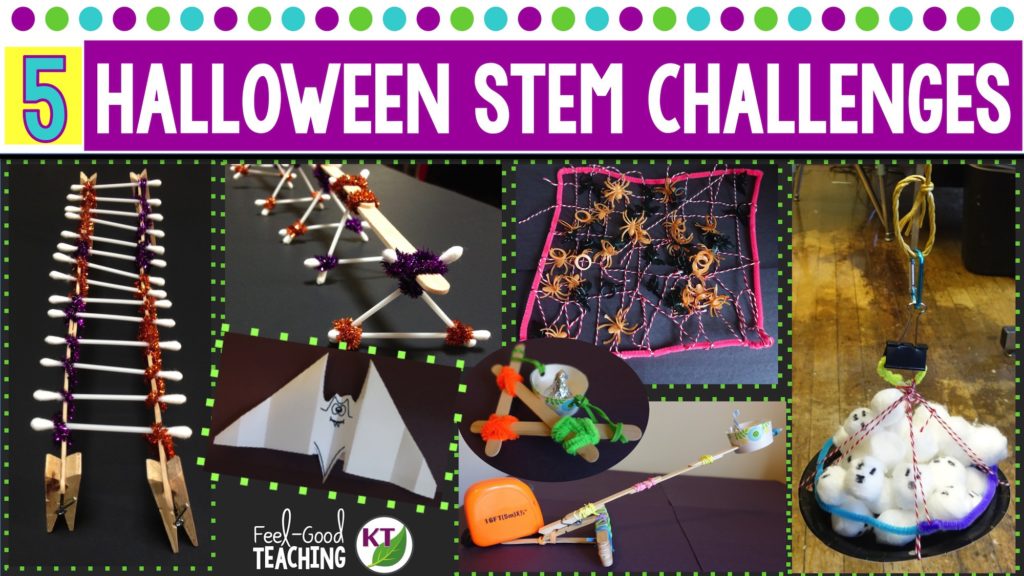Kids have the worst time trying to concentrate on school the day of Halloween — and it’s even worse the day after! You’ll need something extra engaging for them in order to keep their brains working at max capacity. Wouldn’t you know it, I’ve got just the Halloween activity: Ghosts in the Graveyard!
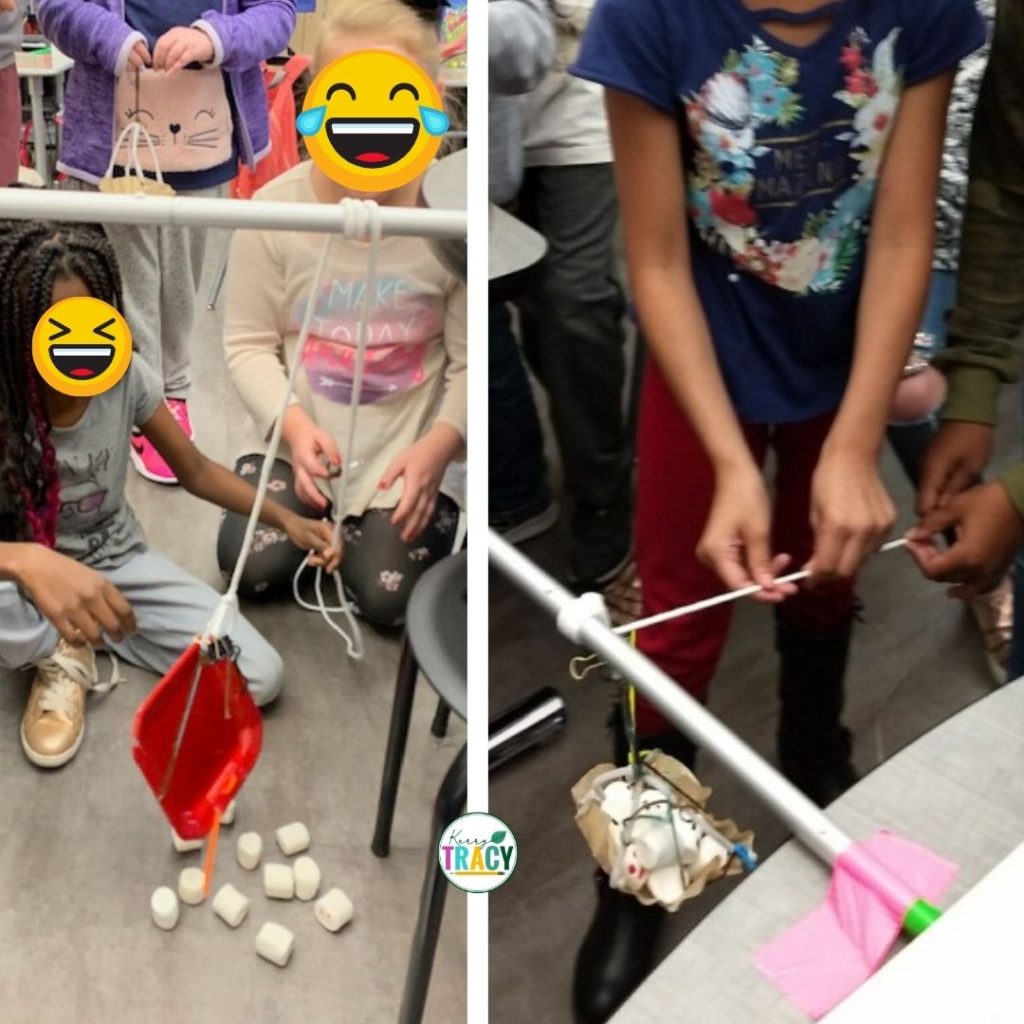
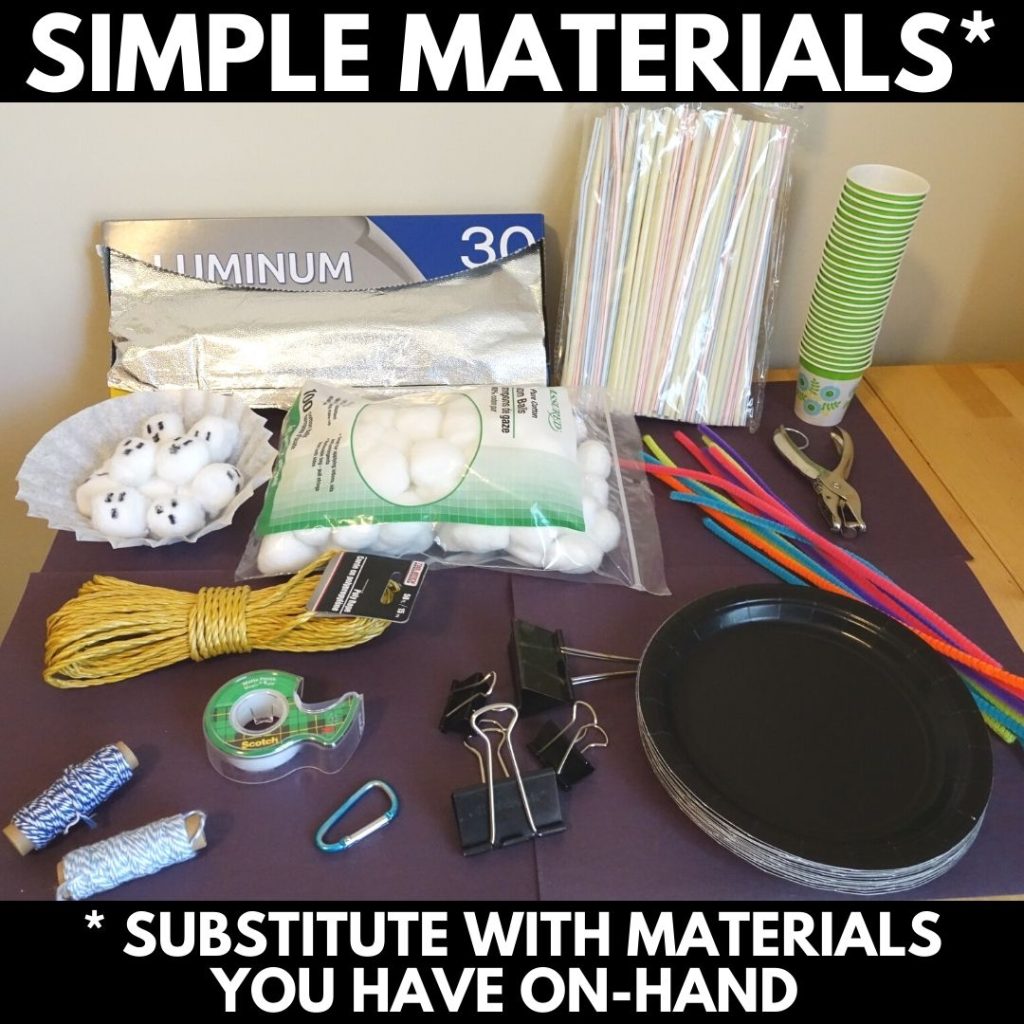
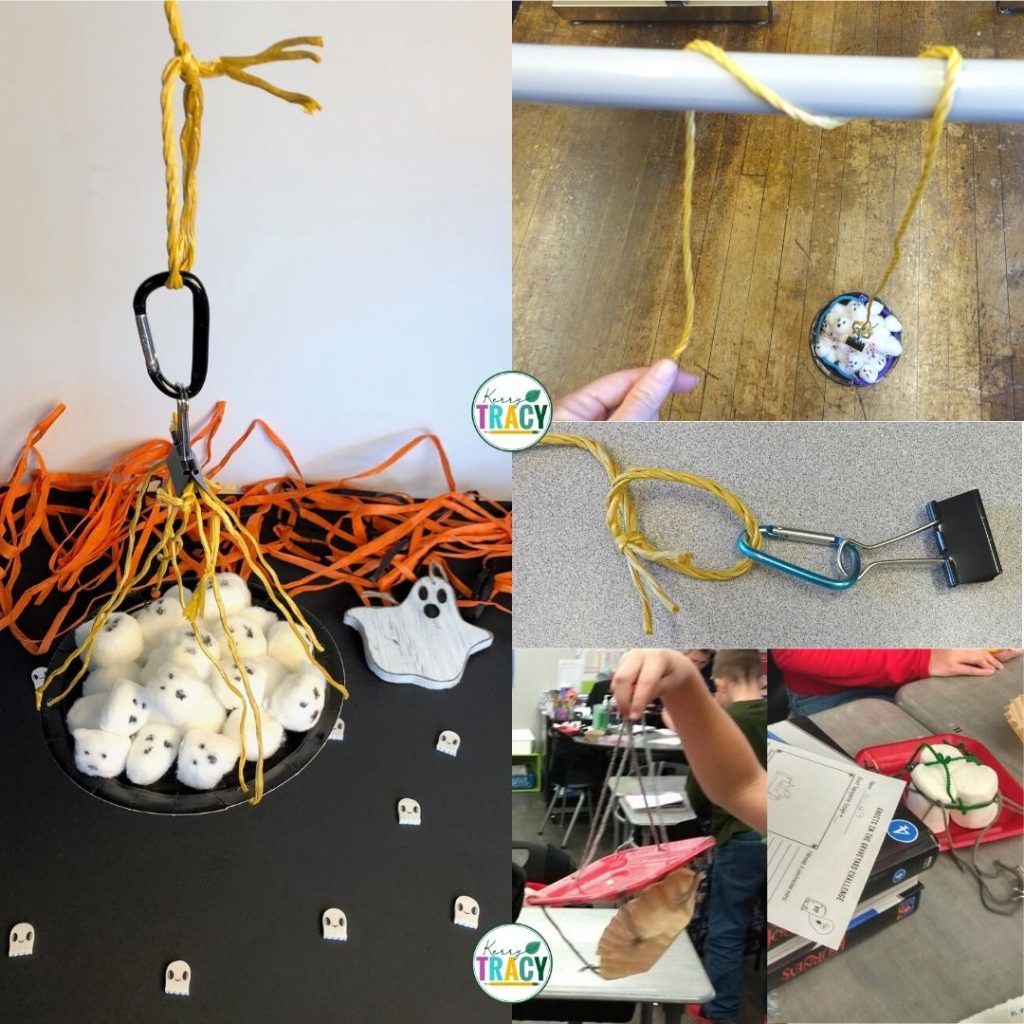
Premise:
Students build a device to lift ghosts out of the graveyard. This is essentially an exploration of pulleys.
Halloween Activity Ban?
If Halloween activities are taboo or forbidden in your classroom, not to worry! Connect this challenge with pulleys and other simple machines. In fact, I made an alternate version called Grapes in the Vineyard that can be used any time of the year. If you’re familiar with my work, you know how much I love alliteration. It was extremely difficult not to call it Grapes in the Grape-yard! You can always find ways around a Halloween activity ban!
Where Can I Find Out More?
Want to know more about materials, how to increase or decrease difficulty for your grade level, and more? See the video below for a walk-through of this challenge. However, if you prefer to read, you’ll find the video transcribed at the end of this post.
Where Can I Find This & Other Halloween Activities?
Yes! You can find this Halloween activity alone (left) or in a bundle of 6 Halloween STEM activities (right). I also have another blog post with 20 Halloween STEM activity ideas to delight you & your students this October! Scroll down for more. ⬇️
Check out 20 Halloween STEM Activities Seen in the Video Below:
Video Transcription
I can’t believe we’re already at week five of the Halloween STEM challenges. This one’s called Ghosts in the Graveyard. The premise is to create an elevator or pulley system to lift ghosts up out of the graveyard. I always like to be sensitive to those who are trying to avoid Halloween activities. If that’s the situation you find yourself in, then you can do the alternate version, which I call Grapes in the Vineyard. I cannot tell you how much I wanted to call the alternate version grapes in the graveyard and I wasn’t sure people would appreciate the tongue in cheek for the sake of alliteration quite as much as I did.
0:38
Let’s take a minute to check out the materials and the STEM Challenge Cycle. This is the STEM Cycle you should follow for every challenge. I’ve defined each step in another video. You can click on the title now to see the cycle explained. Quick tip for setup, if you have time or you have some volunteers, it sure does make this a lot more adorable to have ghost faces on the cotton balls.
If you’re using grapes, you can have faces on the grapes too. If you do decide to put faces on the ghosts, just a quick tip that it works better to stipple rather than to try to color it. Don’t move to marker around too much, just dab it in place a couple of times and the faces come out. This one actually I colored, I can tell because it’s really fuzzy and blurry. They come out a little bit more defined when you just stipple.
1:26
If you are doing this with younger students, then you’re going to want to set up the pulley for them, so that they can see it ahead of time. You just take the rope and you’ll wrap it around the dowel just a couple of time is fine to make a very simple pulley. So because this dowel is wooden, it has a little bit of friction added and the rope is not entirely smooth either. You can see as I pull it up it’s hitting bumps and snags along the way and that’s going to increase difficulty. You might not be looking to increase difficulty. If you don’t want that, then you’re going to want to use something smooth like a PVC pipe or maybe a broom handle that’s made of plastic. You might also look for a higher quality rope.
You can either set it up so that students are holding either end for you. What I usually do is set it up in between two desks and use textbooks to weight down either side, so it’s just stable and you don’t need anyone holding on to it. Inevitably if you have students holding on to it, somebody’ll move or shake or sneeze and then people get upset. For younger students, I like for them to know what their designs are going to need to attach to. I would show them exactly what I just showed you with the dowel and I would show them that the connection point is right here. They’re going to need to build something that can attach to this end.
2:39
This is one option. I have another attachment that I prefer to use, if you have a carabiner available to you. If you have a carabiner, just flip the binder clip around, connect the edges like this, and snap the carabiner through. Then this makes it really easy for students to connect their designs. I usually give the students another clip like this. Now they might not design it in such a way that their clip is facing up or that they even use a clip. They might just have looped ropes, but either way it tends to be pretty quick for a student to attach their design.
Let me put this down for a moment. You might be looking at this and thinking, “Well my students are a little bit older, that seems too simple.” Let me give you a few ideas to make this a little bit more challenging. For older students I just wouldn’t set up the pulley for them at all or any of the attachments. I would show them that they have this dowel and they need to create their elevator working with this dowel and these materials. Another thing that you’re going to want to think about for older students is the materials that you are using.
3:38
For younger students I think using a small paper plate is pretty reasonable. As they get older, I wouldn’t give them something that stable. I might think about actually cutting the paper plates in half and giving them only half of the paper plate. Or even giving them sort of a random or weird materials like a handful of paper clips and maybe a couple of rubber bands. Nothing that’s very solid or flat.
4:02
As far as materials go, one of my favorite things to do is to hand them some materials that don’t really quite make sense to me or some other grouping of materials that I think is impossible. Then I will tell the students it’s entirely possible that the challenge I’m giving you is impossible. For a lot of students this actually frees them up and motivates them because they want to prove me wrong. A few other ideas to increase the difficulty: set the pulley up very high and give them a time limit to get the ghosts from the graveyard to the top of the pulley.
Another thing you can do is to introduce environmental conditions. You could have a fan set up from a distance and just turn it on, make sure it’s the same distance for every group. Make sure it’s the same angle for every group and make sure it’s the same speed for every group. But you can create a wind condition in that way and that will make it more challenging. Clearly with the last two challenges, Treat Toss and Ghosts in the Graveyard this one also lends itself very well to a study on simple machines. You’re ready to do this challenge on your own, but if you want to know more, more modifications, more cross-circular connections. You just want the student handouts so you don’t have to make them yourself, check out the resource.
5:09
Your time is valuable, so why reinvent the wheel. This resource contains everything you need including modifications for use with 2nd through 8th graders. You’ll still need to get the materials of course, but the hard parts are already done. You’ll get Aligned Next Generation Science Standards for grades two through eight, links to my STEM challenge professional development videos to help you get the most from each challenge and the Ghosts in the Graveyard Materials list. In Teacher Tips, you’ll find premise and setup, how to increase or decrease difficulty through the criteria and constraints list, measuring results and cross-circular extension suggestions, which will be especially helpful if you need to prove this is not just a Halloween activity. In fact, this challenge also goes by another title Grapes in the Vineyard.
5:50
You’ll find an editable Criteria and Constraints list so you can tailor the challenge to your students. For Student Handouts, they’re two versions: four-page expanded room for response for younger students and a two-page condensed space paper saver version. You’ll also find a set of group discussion questions. A non-Halloween version of the handouts that you can use anytime of the year is also included. In the Extension Handouts, you’ll find a ghost character and scary by the senses writing templates as well as math and process templates. This resource is available individually and as part of a discounted Halloween and Mega STEM Challenge bundles. Links can be found in the description below.
Hope you enjoyed Ghosts in the Graveyard and all five of the Halloween STEM Challenges. Make sure that you like and subscribe. I’m going to be back next week with frequently asked questions. If you have questions about STEM challenges, feel free to leave them in the comments or you can contact me through my store or my blog. The links are in the description. Even though it’s a little bittersweet that the Halloween challenges are done, Thanksgiving‘s right around the corner.
See you next week.
Pin Me!
